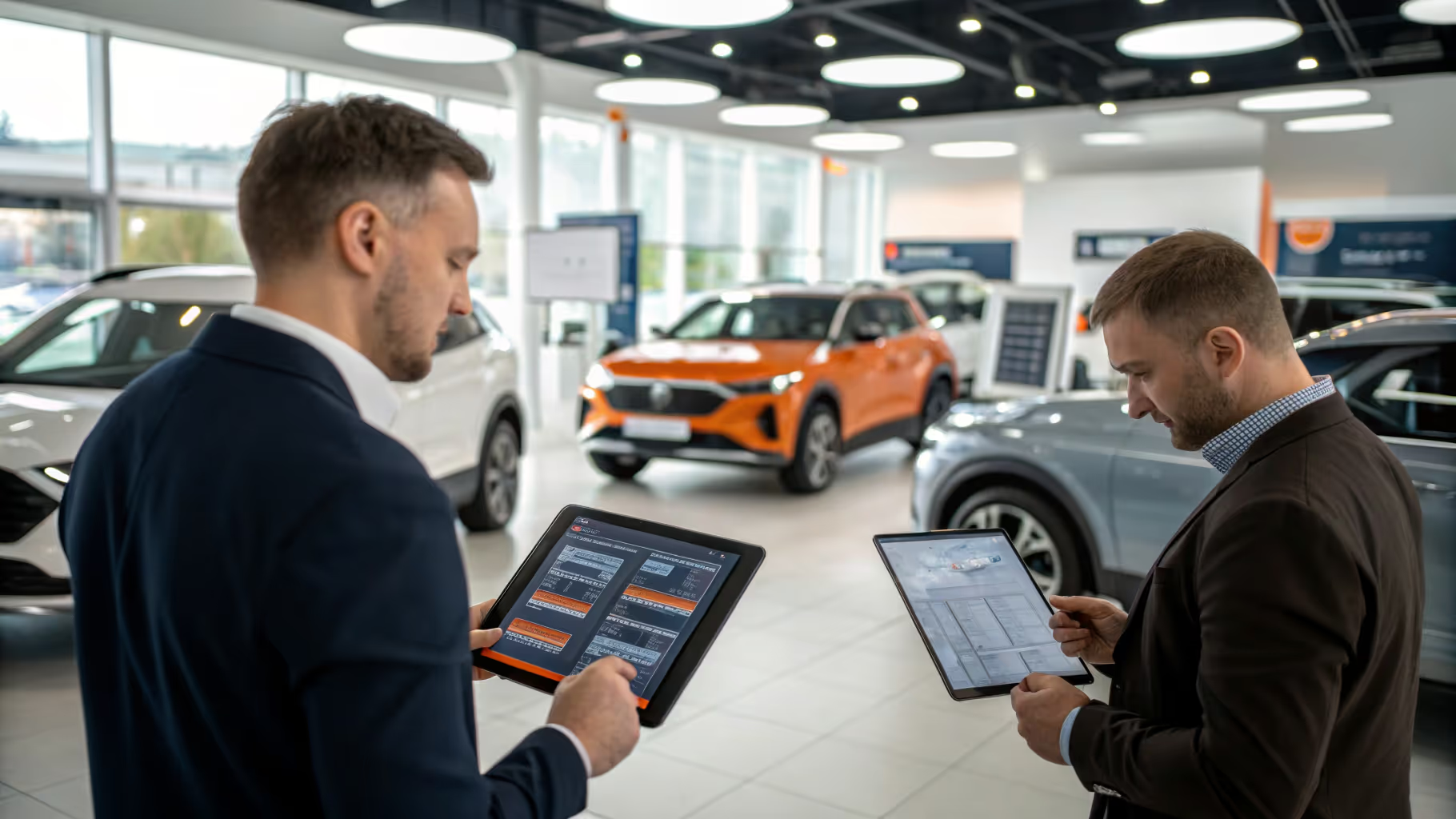AI is transforming car sales by boosting efficiency, improving customer experiences, and increasing dealership revenue.
Here’s what you need to know:
- 95% of car buyers start online, and 60% are open to completing purchases digitally, making AI crucial for modern sales.
- Dealerships using AI report 100% revenue growth, 27% higher appointment rates, and 26% better lead-to-sale conversions.
- AI tools streamline lead management, personalize communication, reduce response times, and optimize inventory, cutting costs by up to 20% and increasing profit margins.
What’s the bottom line? AI isn’t replacing sales teams - it’s giving them the tools to work smarter, close deals faster, and deliver the seamless, personalized service today’s buyers demand.
How Dealers Are Using AI for Sales in 2025 | AI Sales Agents
Better Lead Management with AI
AI has reshaped dealership operations, and one of its standout contributions is transforming lead management. By automating repetitive tasks and identifying high-potential prospects, AI enhances sales efficiency and focuses attention on the leads that matter most.
Automatic Lead Scoring and Follow-Up
AI-powered lead scoring uses predictive analytics to rank prospects based on their likelihood to buy. By analyzing data such as browsing habits, CRM activity, and social signals, these algorithms recognize patterns and trends, prioritizing leads that show strong buying intent. For instance, signals like inquiries about financing or specific vehicle models are flagged as high-priority opportunities [3].
"AI revolutionizes lead generation in car dealerships by analyzing customer behavior, predicting preferences, and recommending specific vehicles and personalized sales tactics based on individual customer data. By harnessing the power of AI, dealerships can enhance their lead qualification processes, forecast vehicle sales accurately, and identify new sales opportunities with greater precision."
- Sean Cassy, Marketing Professional [4]
AI doesn’t stop at scoring. Automated follow-up systems take over with personalized communication, timely appointment reminders, and instant responses. Studies show that contacting leads within 24 hours can boost conversion rates by 60% [6][7].
The impact is clear. One dealership saw a 20% increase in scheduled test drives after implementing AI-driven follow-ups. They also improved response times to new leads by 30% and achieved a 25% jump in lead-to-sale conversions [7]. Sales teams using these tools reported 40% higher response rates while saving 40% of their time, freeing them to focus on closing deals and building customer relationships [7].
This combination of scoring and follow-up doesn’t just improve current lead management - it also breathes new life into dormant prospects.
Reactivating Old Leads in Your Database
Every dealership has dormant leads - prospects who showed interest but never made a purchase. Tools like VisQuanta’s lead loss mitigation AI can re-engage these leads by analyzing past interactions, segmenting them effectively, and tailoring outreach efforts [5]. AI starts by grouping cold leads based on demographics, prior behavior, or content they interacted with. From there, it creates targeted campaigns and determines the best times to engage each group.
Platforms like VisQuanta’s AutoMaster Suite specialize in this process. By integrating with existing CRMs, they tap into dormant data and turn it into actionable opportunities. Using omnichannel engagement - email, social media, phone calls, and messaging apps - these tools reach prospects on their preferred platforms.
The secret to successful reactivation lies in blending AI with a personal touch. AI excels at reigniting interest and identifying opportunities, but human expertise is often needed for complex conversations and negotiations. A seamless hand-off ensures that prospects receive the attention they need. Additionally, AI systems maintain consistent communication without overwhelming leads, using metrics like open rates and click-through rates to refine outreach strategies.
With nearly 40% of leads arriving outside regular business hours, automated tools ensure no potential sale is missed [8]. By combining speed, precision, and personalization, AI is redefining how dealerships manage and revive leads.
Better Customer Communication with AI
For car sales professionals, strong communication skills are just as important as finding the right leads. Today’s customers expect quick, tailored service, and dealerships need to keep up. AI-powered tools are changing the game by streamlining interactions, speeding up response times, and creating better customer experiences. Let’s take a closer look at how chatbots, CRM integration, and automated scheduling are reshaping how dealerships connect with their customers.
AI Chatbots and Virtual Assistants
AI chatbots are like having a round-the-clock assistant. They can handle up to 80% of customer inquiries automatically, freeing up sales teams to focus on building relationships and closing deals[10][11]. These tools are fast - reducing response times by as much as 99% - and meet the expectations of 75% of customers who want immediate answers[11]. By improving response times and engagement, chatbots have increased sales conversion rates by 20–40%.
Major automotive brands are already seeing the benefits. Audi uses an AI-powered chatbot to help customers book service appointments, learn about vehicle features, and even start the car-buying process. This has led to smoother scheduling and happier customers[9]. Similarly, Toyota and Ford use chatbots to assist with maintenance scheduling, provide real-time updates, and offer personalized car recommendations, making the buying experience more interactive and enjoyable[9].
Not only do chatbots improve efficiency, but they also significantly reduce workloads. By cutting call volumes in half and resolving 80% of routine questions, they’re projected to save billions of service hours by 2030.
Connecting AI with CRM Systems
AI becomes even more powerful when paired with Customer Relationship Management (CRM) systems. These integrations allow dealerships to automatically track interactions, create detailed reports, and tailor follow-ups based on each customer’s history and preferences[13]. This level of personalization is essential, especially since 75% of customers expect consistent experiences across all platforms, whether online or in-store[12].
CRM integration also tackles a common problem in the industry: missed opportunities. Only 12.5% of sales leads typically convert, and many go cold if not followed up within a week[12]. Interestingly, up to 50% of buyers choose the first dealership that contacts them. AI systems can alert sales teams when a customer shows renewed interest, helping to re-engage up to 25% of dormant leads and boost lead-to-sale conversion rates by 32%[14]. Responding quickly is key - companies that reach out within five minutes are 10 times more likely to close a deal, and AI can cut initial response times by up to 70%[14].
By monitoring customer behavior and enabling timely, personalized follow-ups, AI helps dealerships nurture leads more effectively, turning potential buyers into loyal customers.
Automatic Scheduling and Follow-Up
Scheduling and follow-ups are often time-consuming, but AI is making these tasks much easier. Automated tools ensure consistent communication with prospects, which is critical since 50% of sales happen after at least five follow-ups - even though many sales reps stop after just two[7]. One dealership using AI-driven follow-up systems reported a 20% increase in test drive appointments, a 30% improvement in response times, and a 25% rise in lead-to-sale conversions[7].
AI also takes the hassle out of scheduling. Automated systems handle appointment bookings without the usual back-and-forth, offering real-time adjustments and sending reminders. This has led to a 38% reduction in no-shows[15][16]. For example, a consulting firm saw a 30% drop in missed meetings after adopting AI scheduling tools, while a healthcare provider reduced no-shows by 25% and improved client satisfaction[16].
With AI-powered receptionists and auto-responders available 24/7, customers can confirm, reschedule, or cancel appointments whenever it’s convenient - even on weekends or holidays[15]. These systems also provide real-time tracking and analytics, helping dealerships refine their communication strategies and boost overall sales performance. AI is not just streamlining operations; it’s creating stronger connections with customers, one interaction at a time.
Increasing Sales and Efficiency
AI is no longer just a tool for better communication and lead management - it’s now at the heart of dealership operations. From keeping inventory levels in check to crafting precise marketing strategies, AI helps dealerships operate smarter. The result? Higher sales, reduced costs, and smoother workflows. These advancements streamline sales processes, paving the way for higher conversion rates.
AI-Powered Inventory Management
Managing inventory has always been a tightrope walk. Order too many vehicles, and you’re stuck with rising storage costs and depreciation. Order too few, and you miss out on sales. AI steps in to eliminate the guesswork, using data to predict what customers want and when they want it. Dealerships leveraging AI-powered inventory systems report up to 35% less inventory waste, 30% faster stock turnover, and 40% less overstock [17]. By analyzing factors like seasonal trends, local demand, customer preferences, and economic data, these systems pinpoint which vehicles will move quickly.
"AI-powered inventory management is not just a technological upgrade; it's a strategic necessity. By embracing AI, dealerships can transform their operations, stay ahead of the competition, and meet the evolving demands of the market." [17]
The benefits aren’t just theoretical. A Midwest dealership saw a 20% reduction in the time vehicles sat in inventory and a 15% boost in sales margins by adopting an AI-driven strategy [18]. Meanwhile, a West Coast dealership improved service department bookings by 30% with predictive maintenance algorithms [18]. The key to success? Setting clear inventory goals before diving into AI. With the right approach, dealerships can ensure they always have the right cars on the lot at the right time.
Targeted Marketing Campaigns
While AI helps cut costs through smarter inventory management, it also turns interest into action with precision marketing. Generic, one-size-fits-all campaigns are a thing of the past. Today’s buyers expect a personalized touch, and AI delivers by analyzing customer data to create hyper-targeted campaigns. These campaigns reach the right audience with the right message at the right time, boosting digital campaign engagement by 30% [1]. Considering that 80% of car shoppers rely on digital channels like online videos and search engines for research, this personalization makes a real difference [1].
AI also brings efficiency to marketing by syncing ads with current inventory. When a vehicle sells, the system automatically removes it from active campaigns, ensuring customers only see what’s available. Beyond that, AI tailors messages based on buyer behavior and preferences - showing electric vehicles to eco-conscious shoppers or highlighting family-friendly SUVs with advanced safety features [19]. This data-driven strategy not only strengthens customer relationships but also helps dealerships maintain healthy profit margins.
Improving Sales Processes
AI doesn’t stop at lead management or marketing; it also transforms every stage of the sales process. From identifying high-potential leads to finalizing financing, AI streamlines the journey. By prioritizing leads most likely to convert, sales teams can focus their efforts where it counts, leading to higher conversion rates [20].
Throughout the buying process, AI personalizes the experience. It can suggest tailored vehicle recommendations and create custom offers based on a customer’s preferences [20]. For example, dealerships using AI-powered chatbots have reduced response times for customer inquiries by 35%, improving satisfaction and loyalty [21].
AI’s impact extends to financing as well. Loan approval times can drop by as much as 70% with AI-powered solutions [1], making the car-buying process faster and less stressful. These systems also simplify documentation and financing procedures without compromising the customer experience. Advanced inventory platforms have shown they can speed up vehicle turnover and increase sales margins [1].
For dealerships ready to adopt a comprehensive AI approach, solutions like VisQuanta's AutoMaster Suite offer an all-in-one platform. Combining lead management, CRM integration, and sales process optimization, this system works seamlessly with existing tools to refine workflows and enhance team performance. AI isn’t just about keeping up - it’s about moving ahead.
AI Applications in Car Dealerships
AI continues to shape the way dealerships operate, offering real, measurable benefits across the board. From streamlining lead management to improving communication and overall operations, dealerships nationwide are seeing results they can quantify.
Success Stories from Dealerships
The numbers speak for themselves. A dealership client tracked their performance over two reporting periods in March 2025, and the results were striking. In the first period, they managed 1,046 buyer engagements, set 12 appointments, retained 3 clients, sold 1 car, and reactivated 94 neglected customers along with 952 old leads. In the second period, the dealership recorded 1,009 buyer engagements, 11 appointments, 3 retained engagements, 1 car sold, and reactivated 87 neglected customers and 922 old leads [22].
Dealerships across the country are sharing similar success stories. One customer highlighted the impact of AI on response times:
"We went from taking 24–48 hours to respond to leads to doing it instantly, 24/7. Our appointment rates jumped almost overnight".
A service director emphasized how AI has freed up their team:
"The AI solution gave my team time back. We now spend more time solving customer problems and less time chasing them".
The data backs up these testimonials. A dealership group in the Midwest reported a 17% improvement in customer retention over 12 months. AI-powered service touchpoints drove a 20–30% increase in service appointments , while personalized AI email campaigns achieved open rates above 45% and nearly doubled the industry average for click-through rates.
Sean Western, director of marketing at Quirk Cars, shared how AI has transformed their operations:
"We have, I'd say, capitalized on opportunities we would have missed, just based on the customer follow-up and things like that. So it definitely has positively affected our bottom line" [2].
He further explained:
"I don't look at it as, hey, I'm scared this is going to take over my job. This is just like a tool that helps me give my customers a better experience. I'm essentially at the wheel of this ship, and I have all the cadence that makes driving easy" [2].
Old Methods vs. AI-Powered Workflows
The difference between traditional methods and AI-driven processes is stark, and the advantages are clear:
| Metric | Traditional Methods | AI-Powered Workflows |
|---|---|---|
| Service Appointments | Manual scheduling | 20–30% increase |
| Customer Retention | Standard rates | 17% improvement |
| Email Performance | Industry averages | 45%+ open rates |
| SMS Campaigns | BDC Sends Manual | 80% open rates |
| Cold Lead Reactivation | Minimal | 25% increase [22] |
Traditional dealership operations often rely on manual follow-ups, generic marketing strategies, and reactive customer service. AI, on the other hand, automates responses, personalizes communication, and even predicts customer needs. The result? Increased efficiency and better outcomes. In fact, 100% of dealerships using AI reported higher revenues over the past year [23].
Proven Returns from AI Investment
The financial benefits of AI are undeniable. For example, VisQuanta's AutoMaster Suite has generated over $8.5 million in additional revenue for its dealership clients.
Consider this: a high-traffic dealership group with 150,000 monthly website visitors and a 2% conversion rate could see a massive lift by leveraging AI. If AI agents improve conversion rates by 25%, that dealership could add $315 million in revenue, boosting its base from $1.26 billion annually [25]. Additionally, by increasing the average order value from $35,000 to $42,000 per vehicle (a 20% rise), they could add another $315 million annually.
AI also slashes costs. By using conversational AI to filter and qualify 6,000 inbound inquiries monthly - 60% of which are low-intent - a dealership could save $525,000 a year. AI-driven lead nurturing could further reduce Business Development Center overhead by up to $240,000 annually [22].
The industry is taking notice. In 2025, 81% of dealerships plan to increase their AI budgets compared to the previous year, and 95% of dealer executives consider AI either "very important" or "important" for future success [2]. By Q4 2025, AI integration in dealership operations is expected to reach 50% [22], giving early adopters a clear edge in the market.
Conclusion: AI's Future in Car Sales
AI has already proven its value in key areas like lead management, customer communication, and inventory control, giving car dealerships a clear advantage. It's not a matter of if AI will shape the future of car sales - it’s a question of how quickly dealerships can adopt it to stay competitive in a rapidly changing market.
The numbers speak for themselves: dealerships that have integrated AI report universal revenue growth. Metrics show a 33% increase in lead engagement and a 20–30% rise in service appointments, directly contributing to higher profitability [23]. These are not just incremental improvements - they're shifts that redefine how dealerships operate.
Consumer expectations are also driving this transformation. A staggering 71% of buyers now expect personalized interactions, while 76% grow frustrated with generic, impersonal service [27]. Traditional sales approaches simply can't scale to meet these demands. With more buyers shopping online and stepping away from showroom-first experiences, dealerships must adapt. Real-time communication, quick responses, and tailored interactions are no longer optional - they’re essential. AI provides the tools to meet these expectations consistently and efficiently.
The rise of direct-to-consumer models only adds to the urgency. To compete with major players like Ford and General Motors - who are already leveraging AI chatbots and virtual assistants to cut wait times by 60% - dealerships must deliver the kind of personalized experiences that set them apart [1].
Far from replacing salespeople, AI enhances their capabilities. It ensures responsiveness and frees up time for more meaningful, high-value tasks. For example, dealerships using AI have seen a 32% boost in lead conversion rates [26]. Digital campaigns powered by AI achieve 30% higher engagement, while AI-personalized emails boast open rates exceeding 45% and nearly double the industry average click-through rates [1].
The path to successful AI integration starts with a focused approach. Begin with targeted applications, such as lead management or customer communication, before expanding into broader areas [27]. Set clear benchmarks, monitor key performance indicators, and adjust strategies as needed. Most importantly, invest in training your team to ensure they understand and maximize the potential of these tools [27].
"Winning in 2025 will be less about outspending rivals and more about out-smarting them." - Al Sefati [26].
VisQuanta's AutoMaster Suite is a prime example of AI's potential, having generated over $8.5 million in additional revenue for its dealership clients. The message is clear: dealerships that embrace AI today will be the ones thriving tomorrow. AI isn’t just about selling cars - it’s about revolutionizing the customer experience through smart automation and data-driven insights. The dealerships that act now will lead the way as the automotive industry continues to evolve.
FAQs
How does AI make lead management more effective for car sales professionals?
AI is transforming lead management for car dealerships by automating crucial tasks, helping teams work smarter and faster. One standout feature is lead scoring, which evaluates and ranks potential customers based on their likelihood to buy. This ensures sales teams concentrate their efforts on the most promising prospects.
Beyond prioritization, AI tools handle follow-ups and revive inactive leads automatically, cutting down on repetitive tasks. By streamlining these workflows, sales professionals can shift their focus to what truly matters - building strong customer relationships and closing deals. The result? A more efficient process and better overall performance.
How can AI tools improve customer communication and the overall experience in car sales?
AI tools are transforming how dealerships connect with their customers, making interactions smoother and more tailored to individual needs. Chatbots and virtual assistants play a big role in this shift. They can handle inquiries instantly, set up test drive appointments, and send reminders - cutting down on wait times and making the process more convenient for buyers.
On top of that, AI dives into customer preferences and behavior patterns to offer personalized recommendations and marketing. By delivering offers and suggestions that resonate with each customer, dealerships can create a more engaging and hassle-free buying experience. These advancements don't just improve customer satisfaction - they also help build trust and boost sales.
What financial benefits can car dealerships expect from using AI technology?
Integrating AI into car dealership operations has proven to be a game-changer for boosting financial performance. Dealerships are seeing tangible results, such as higher lead conversion rates, quicker response times, and re-engagement of previously inactive leads. AI tools excel at pinpointing high-potential customers, which not only drives more sales opportunities but also helps teams focus their efforts on leads that truly matter.
On top of that, the cost savings are hard to ignore. Some dealerships have reported cutting operational expenses by hundreds of thousands of dollars annually. The revenue side tells an equally compelling story, with many dealerships achieving sales growth of 20% or more and increasing their repair order volumes. These outcomes highlight how AI isn’t just a technological upgrade - it’s a smart move for improving both profitability and efficiency in U.S. car dealerships.
.avif)




.jpeg)

.avif)




.svg)

